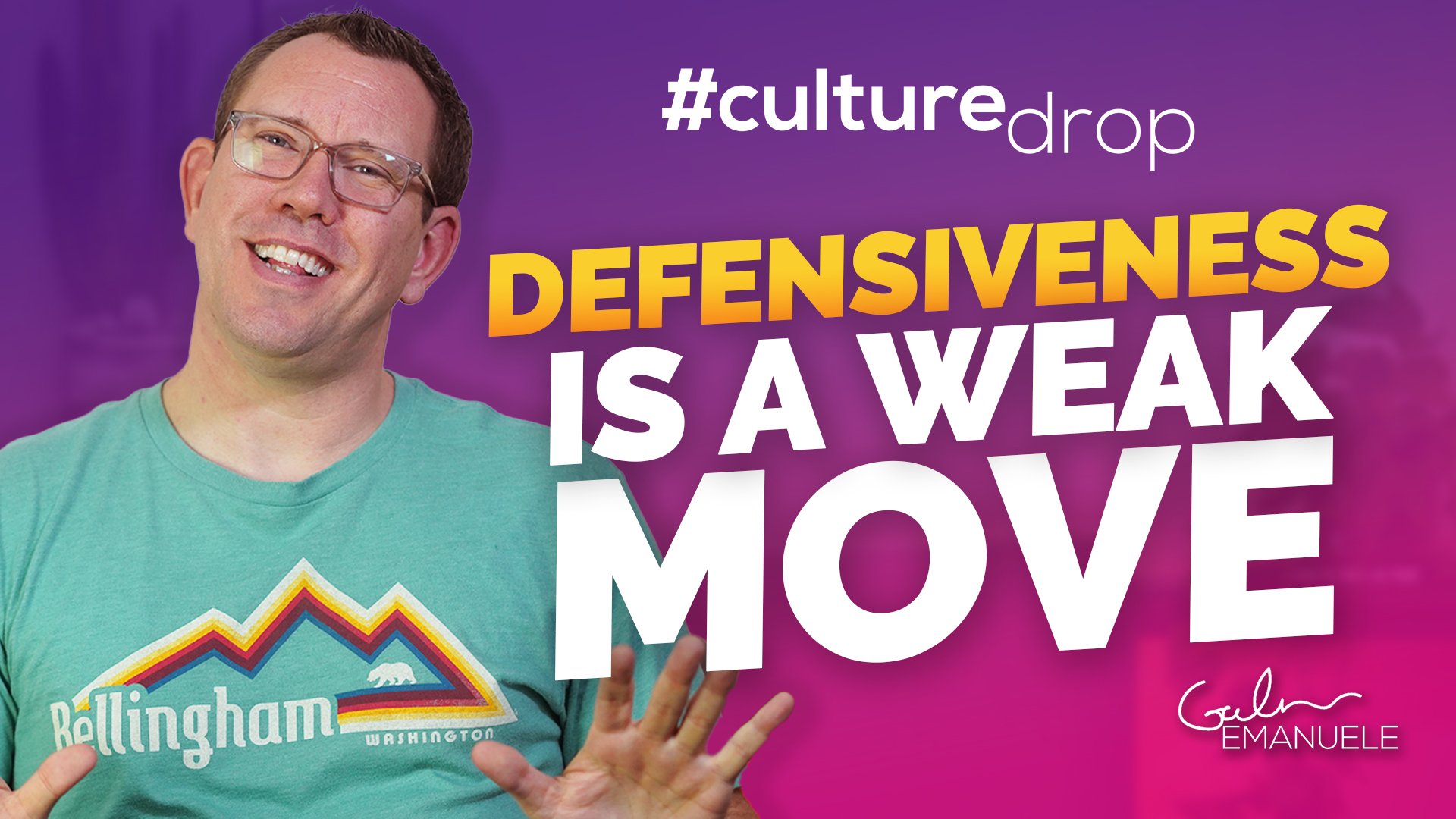Defensiveness Kills Communication & Relationships
Welcome to the #culturedrop. Every Tuesday, Galen Emanuele emails tools to advance leadership skills, team culture, and personal growth. No spam, just great content. Sign up now to get it in your inbox.
This is critical to your relationships and ability to move through conflict.
Don’t be defensive.
Of course, that’s easier said than done, but if you want to level up your state of emotional awareness, then this is huge. Not becoming defensive is a level of self-control to shoot for, and it’s possible but takes practice to unlearn this behavior.
The next time someone gives you feedback that you don’t agree with, or maybe accuses you of something, the question that I would love to flash across your mind is: Is there any part of this situation that will be made better by me being defensive?
“Is there any part of this situation that will be made better by me being defensive?”
You’ll find in pretty much every instance that the answer is no — no situation is made better by that.
Essentially, when you become defensive, the conversation becomes about you. I love this quote by James Richardson — “Defensiveness is a self-perpetuating cycle.”
The full quote published in Physician Executive (Vol. 16, Issue 5) is even more of a heavy-hitter:
There is a little wonder that effective communication often ends when the speaker or listener becomes defensive. In response to defensiveness, "attack or avoidance" replaces "fight or flight," in a self-perpetuating cycle of events, leading to more threats and accusations, and more defensive behaviors and counterattacks. (Richardson, 1990)
It is so important to understand that defensiveness typically results in the conversation (and relationship) suffering as an effect of both parties feeling attacked.
Keeping your cool
Even when something isn’t delivered respectfully or worded well, it’s important to remain calm and not become defensive. Most people who give poorly delivered feedback simply aren’t great communicators and/or lack high emotional intelligence.
It’s usually not a reflection of you, but of that person’s inability to frame up and communicate what they want to say effectively.
“Most people who give poorly delivered feedback simply aren’t great communicators and/or lack high emotional intelligence.”
In those moments, if you can catch yourself and be aware of your reaction, you might be able to steer the conversation to a more positive place, or at least prevent it from escalating into an unproductive argument.
How to do it
As I mentioned, this is an incredibly hard behavior to unlearn. Some helpful tips on how to react less defensively are to:
remain curious and ask questions for clarification and to have the other person explain their perspective
keep your volume and tone of voice in check and less emotionally charged
be very intentional about your word choice and what you say
In that vein, here are some phrases you can say to open up the conversation and ideally prevent you from becoming defensive:
“I hear what you’re saying, my perspective is a little different, do you mind of I share it?”
“You’re not having a great experience, let’s try to find a solution together.”
“Tell me more about what you are thinking and your experience.”
“I want to better understand where you’re coming from.”
And in the event that you’ve hurt someone’s feelings or caused them to become upset:
“I’m sorry that I had that impact on you. Can we talk through this together?”
Using these phrases to keep the conversation from turning defensive can be extremely helpful. Also, asking the other person to share more and keep talking is a way for you to be able to take a breath and not feel like you have to respond right away.
Using curiosity as an aid
It’s also important to think about the outcome of the situation and how you want it to look like in the end instead of saying something that immediately causes conflict. Approach their feedback with curiosity — What frame of mind might they be in? What more do I need to know to get a full picture of the scenario? How can I understand them in this instance?
The reality is that this is incredibly hard to do. It’s a skill that takes practice, patience, and presence of mind during situations where you typically feel an urgent need to defend yourself and dive head first into an argument.
But pausing instead of having a big reaction, keeping your walls and hackles down, and embracing some courage to have a potentially difficult conversation calmly is all so important to your relationship with that person.
“People are going to deliver feedback or say things to you at some point that make you feel immediately defensive.”
Final thoughts
Conflict and static in relationships (work, friends, romantic partners, parents, etc.) is unavoidable. People are going to deliver feedback or say things to you at some point that make you feel immediately defensive.
If you can learn to pause, slow down, take a deep breath, and approach the situation calmly using thoughtful language, it will go a long way. Responding this way makes the conversation productive, keeps the relationship intact, and results in better outcomes that are more beneficial than fighting it out. Practice, practice, practice.
Sources:
Richardson, J. M. (1990). American College of Physician Executives: Physician Executive, 16(5).
Related Articles:
Want more?
This article was created by Galen Emanuele for the #culturedrop. Free leadership and team culture content in less than 5 minutes a week. Check out the rest of this month's content and subscribe to the Culture Drop at https://bit.ly/culturedrop








